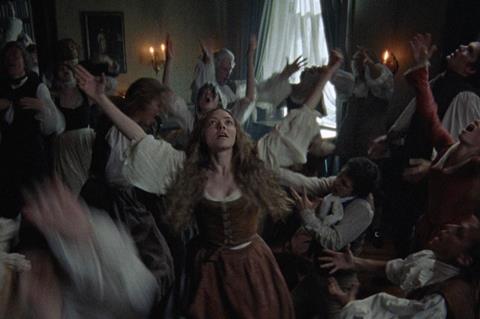Mona Fastvold and co-writer Brady Corbet’s uneven biopic of the eponymous Shaker founder bows in Venice Competition

Dir: Mona Fastvold. UK. 2025. 136mins
The story of Ann Lee (Amanda Seyfried), an eighteenth-century female preacher and the founder of the Shaker movement, is explored through the medium of the musical in this distinctive but uneven historical oddity by Mona Fastvold. A splinter group from the Quakers, the Shakers (or Shaking Quakers) were distinguished by a belief in celibacy and communal living, plus an approach to worship that involved singing, dancing and generally flailing about – all of which is incorporated into the picture. It’s a bold stylistic device, but one which might have worked better if the characters were more satisfyingly developed, and the story itself was eventful enough to support the film’s overlong running time.
An unusual and daring work
The latest directorial outing from Norwegian filmmaker Fastvold, The Testament Of Ann Lee, which premieres in Venice competition, should be an item of interest as it follows her impressive frontier lesbian drama The World To Come and her contribution to The Brutalist, which she co-wrote with her partner Brady Corbet. They collaborate once again on this picture – Corbet is a co-writer – but early speculation about the film’s awards potential may prove to be unfounded.
Ann Lee lacks the stylistic bravura and generous epic sweep of The Brutalist, and, unlike something like Emilia Perez, its musical numbers lack the range, variety and toe-tapping immediacy required to sear a song into the audience’s consciousness. Still, divisive as it will likely prove to be, Ann Lee is an unusual and daring work, and should earn as many supporters as it does detractors.
It’s not just the decision to tell the story as a musical which is an audacious and unexpected choice, but also the approach to the cinematography. To the uninitiated, the Shaker movement is best known not for the uninhibited nature of its religious fervour, but for its cabinetry. Unshowy and restrained, Shaker craftsmanship is the apogee of harmony between form and function (only slightly devalued by being adopted as marketing shorthand for a type of mass-produced fitted kitchen).
It’s an approach that Fastvold might have woven into her filmmaking. Yet the structure and cinematography could barely be less classically ‘Shaker’ in its approach. Rather than creative precision, Fastvold instead takes as an inspiration the feverish, uninhibited intensity of Shaker worship, with the camera (like The Brutalist, Ann Lee was shot on 70mm film) tossed around amid flailing hair and exultant arms held aloft.
Divided into chapters identified by bookplate-style titles, Ann’s story is narrated by her loyal disciple, Mary (Thomasin McKenzie), a woman who buys into the widely held belief that Ann is the second coming of Christ. Like Ann, Mary accumulates scars earned from society’s resistance to the Shaker ethos, and their voluble and excitable approach to worship. Ann Lee is born, we learn, in working-class Manchester, on the 29th February, 1736 (Seyfried, it’s fair to say, never seems fully at ease with the character’s accent).
The close quarters of the family home mean that Ann is exposed to her parents’ intimate moments, triggering an early aversion to acts of ‘fornication’. Her marriage, to brooding blacksmith Abraham (Christopher Abbott), is a troubled union. And after the deaths of all four of her children before the age of one, Ann retreats entirely from the physical side of the union, devoting herself to hard work and praising the Lord and earning a small but dedicated following in the process. But Ann becomes convinced that she has been chosen to take her church to America and, accompanied by eight congregants (the number drops to six once two succumb to the pleasures of the flesh), she embarks on the perilous journey to the New World.
Although the film is factually based, there is a nebulous, dreamlike quality to the storytelling, as if we are inhabiting one of Ann’s visions or visitations. Part of this comes from the musical aspect of the film, and part from the somewhat distorted view resulting from having Mary as our guide. If not an unreliable narrator, she’s certainly a partisan one. It’s a frayed fabric of a story that contains moments of daring artistry and beauty, but doesn’t always knit together into something satisfying and solid.
Production company: Kaplan Morrison, Intake Films, Proton Cinema
International sales: Charades, sales@charades.eu
Producers: Andrew Morrison, Joshua Horsfield, Viktória Petrányi
Screenplay: Mona Fastvold, Brady Corbet
Cinematography: William Rexer
Editing: Sofia Subercaseaux
Production design: Samuel Bader
Music: Daniel Blumberg
Main cast: Amanda Seyfried, Thomasin McKenzie, Lewis Pullman, Stacy Martin, Tim Blake Nelson, Christopher Abbott, Matthew Beard, Scott Handy, Jamie Bogyo, Viola Prettejohn, David Cale
























